Related Research Articles

Arthur Ingram Boreman was an American lawyer, politician and judge who helped found the U.S. state of West Virginia. Raised in Tyler County, West Virginia, he served as the state's first Governor, and a United States senator, as well as represented Wood County in the Virginia House of Delegates, and served as a circuit judge before and after his federal service.
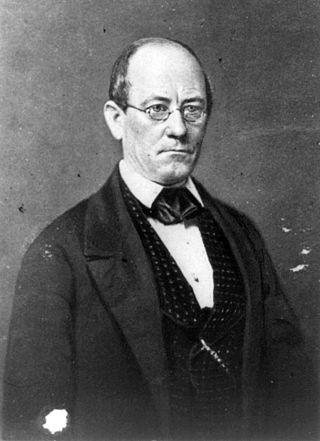
John Letcher was an American lawyer, journalist, and politician. He served as a Representative in the United States Congress, was the 34th Governor of Virginia during the American Civil War, and later served in the Virginia General Assembly. He was also active on the Board of Visitors of Virginia Military Institute.

John Brown Baldwin was a Virginia lawyer and Democratic politician, who served one term in Virginia House of Delegates before the Virginia Secession Convention of 1861, during which he was a Unionist. During the American Civil War, Baldwin believed his primary loyalty was to his state, and served as one of Virginia's representatives to the First and Second Confederate Congresses. He became one of the leading critics of President Jefferson Davis, who was seen by many as usurping the Confederacy's states' rights principles. During Congressional Reconstruction, Baldwin became Speaker of the Virginia House of Delegates.

Waitman Thomas Willey was an American lawyer and politician from Morgantown, West Virginia. One of the founders of the state of West Virginia during the American Civil War, he served in the United States Senate representing first the Restored Government of Virginia and became one of the new state of West Virginia's first two senators. He is one of only two people in U.S. History to represent more than one state in the U.S. Senate, the other being James Shields.

The Virginia Conventions have been the assemblies of delegates elected for the purpose of establishing constitutions of fundamental law for the Commonwealth of Virginia superior to General Assembly legislation. Their constitutions and subsequent amendments span four centuries across the territory of modern-day Virginia, West Virginia and Kentucky.

Waller Redd Staples was an American lawyer, law professor, judge, slave-owner and politician who was briefly a member of the Virginia General Assembly before the American Civil War, became a Congressman serving the Confederate States of America during the war, and after receiving a pardon at the war's end became a judge of the Virginia Court of Appeals, and law professor at Washington and Lee University, as well as revisor of Virginia's laws (1884-1887).

John James Allen was a Virginia slave owner, lawyer, judge and politician. He served in the Virginia Senate, the 23rd United States Congress, and for 25 years as judge and President of the Virginia Supreme Court of Appeals. He supported Virginia's secession during the American Civil War, and all his surviving sons joined the Confederate States Army, the two youngest dying in the conflict.
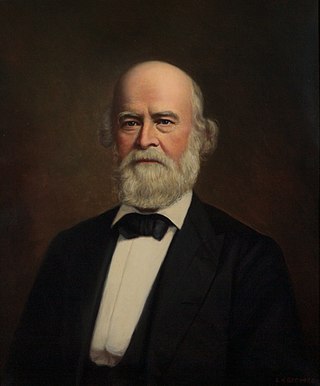
Wood Boulden, also known as Wood Bouldin, was a Virginia lawyer, plantation owner and politician. He served as a justice of the Supreme Court of Virginia from 1872 to 1876.
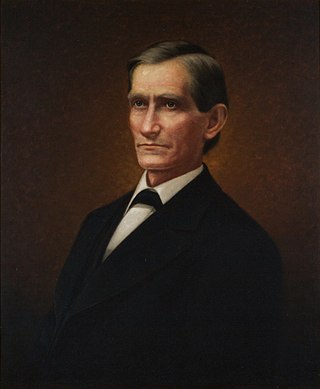
Edward Calohill Burks was a Virginia lawyer, legislator and jurist, as well as a relative of several other Virginia lawyers or legislators representing Bedford County. He served as a judge on the Supreme Court of Virginia from January 9, 1877 through December 31, 1882.

George Western Thompson was a nineteenth-century Virginia politician, lawyer and judge. He served one term in the U.S. House of Representatives, resigning to become a state judge. During the American Civil War Judge Thompson resigned that position as because he believed the creation of West Virginia to be illegal.
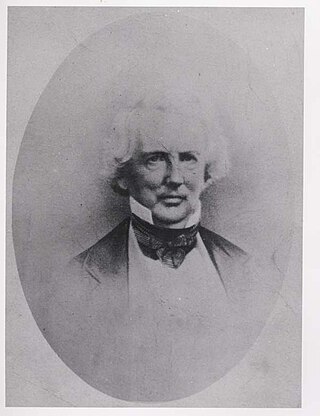
John Janney was an influential member of the Whig Party in Virginia prior to its demise, delegate to the Virginia General Assembly from Loudoun County and served as President of the Virginia Secession Convention in 1861.
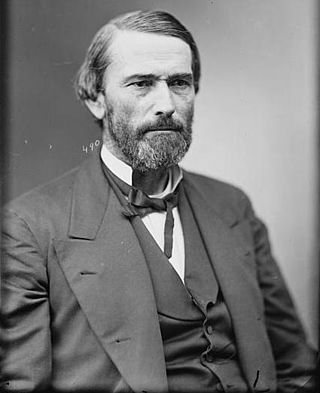
Benjamin Wilson was an American lawyer and Democratic politician who served as a United States Representative from West Virginia) (1875–1883) and as an assistant attorney general during the administration of President Grover Cleveland.

William Alexander Harrison was a Virginia lawyer, judge and politician who helped found the state of West Virginia. He represented Harrison County, Virginia in the Virginia House of Delegates for three successive terms before the American Civil War and strongly opposed Virginia's secession. He helped form the new state of West Virginia and served as a circuit court judge during the American Civil War before winning election as one of the first judges of the Supreme Court of Appeals of West Virginia.
Virginia v. West Virginia, 78 U.S. 39 (1871), is a 6-3 ruling by the Supreme Court of the United States that held that if a governor has discretion in the conduct of the election, the legislature is bound by his action and cannot undo the results based on fraud. The Court implicitly affirmed that the breakaway Virginia counties had received the necessary consent of both the Commonwealth of Virginia and the United States Congress to become a separate U.S. state. The Court also explicitly held that Berkeley County and Jefferson County were part of the new State of West Virginia.

Hugh W. Sheffey was a Virginia politician, lawyer and judge. He represented Augusta County in both houses of the Virginia General Assembly before and during the American Civil War, and served as the Speaker of the Virginia House of Delegates from 1863 until 1865, when he was elected a judge. Removed from office during Congressional Reconstruction because he could not sign a required loyalty oath, Sheffey returned to his legal practice and became an adjunct professor at Washington & Lee University School of Law from 1875 to 1885.
Frank Cruise Haymond was a justice of the Supreme Court of Appeals of West Virginia.
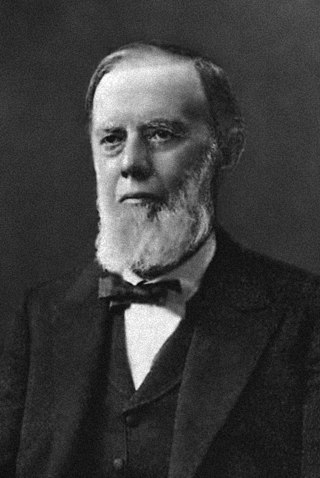
Edwin Maxwell was an American lawyer, judge, and politician in the U.S. state of West Virginia. Maxwell served as Attorney General of West Virginia in 1866 and was an associate justice of the Supreme Court of Appeals of West Virginia from 1867 until 1872. He was elected to the West Virginia Senate and the West Virginia House of Delegates.

Ralph Lazier Berkshire was a lawyer, judge, and Republican politician who helped found the state of West Virginia and became the first chief justice of the Supreme Court of Appeals of West Virginia. Although defeated for re-election, Berkshire again served from September 10, 1868 until December 31, 1872, and later represented Monongalia County in the West Virginia Senate (1874-1878) as well as continued practicing law.

James Paull was a prominent lawyer, politician and judge in Wheeling in what became West Virginia during his lifetime. Before the American Civil War, Paull represented Ohio County in the Virginia General Assembly as a Whig, then attended the First Wheeling Convention, which led to the area's secession from Virginia and creation of the state of West Virginia. During his final years, Paull served as a judge of the West Virginia Court of Appeals, having won election as a Democrat, from January 1, 1873, until his death on May 11, 1875.
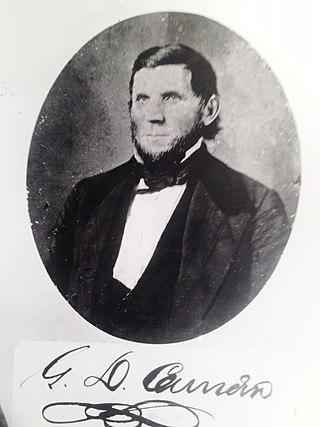
Gideon Draper Camden was an American lawyer, judge and politician who opposed the creation of the state of West Virginia and sympathized with the Confederacy, but later served in the West Virginia Senate representing Harrison County.
References
- ↑ The National Cyclopaedia of American Biography, vol. XII, James T. White & Co., 1904, p. 432.
- ↑ Prominent Men of West Virginia, George Wesley Atkinson and Alvaro Franklin Gibbens, W. L. Callin, 1890, p. 244.
- ↑ http://www.themountaineagle.com/news/2014-07-16/Features/Thomas_S_Haymond_was_influential_coal_man_in_Letch.html Archived 2016-09-18 at the Wayback Machine The Mountain Eagle, July 16, 2014, "Thomas S. Haymond was influential coal man in Letcher, Floyd counties"